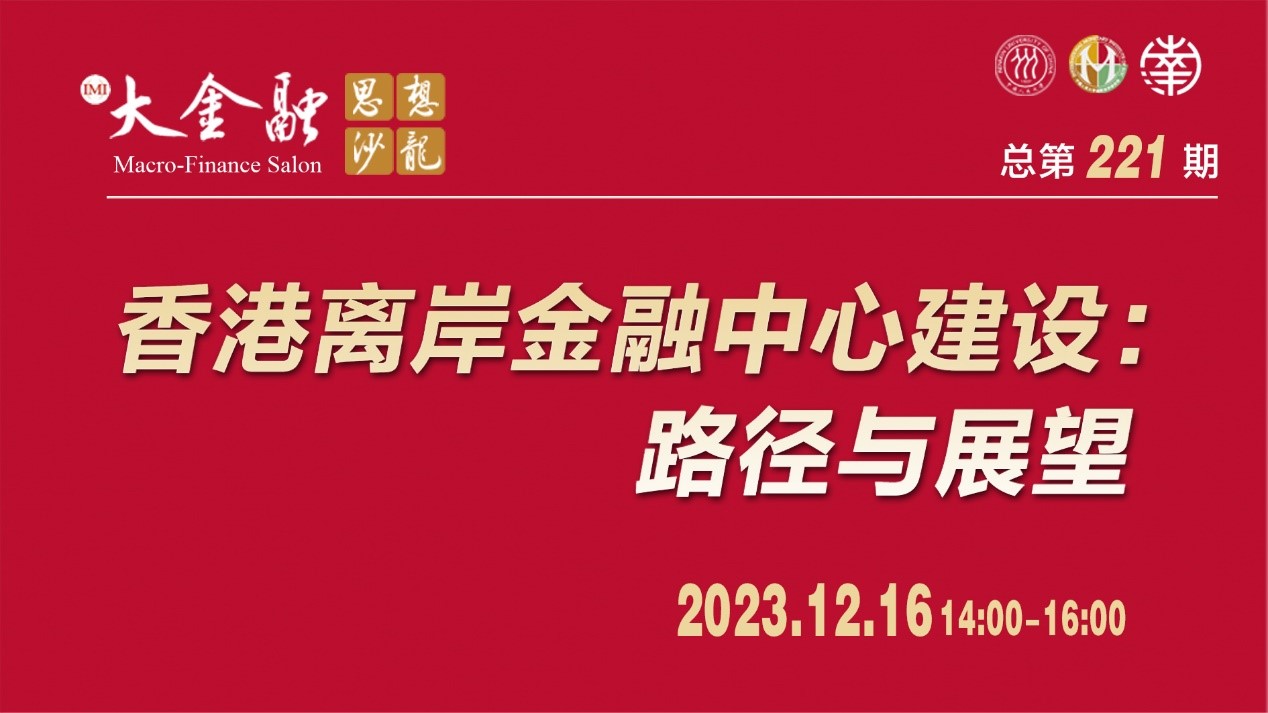Macro-Finance Salon (No.221): Building Hong Kong Offshore Financial Center: Strategies and Outlook
2024-01-12 IMI

On December 16, the Macro-Finance Salon (No. 221), co-organized by the School of Finance and National Finance Academy of Renmin University of China and Nanyang Commercial Bank, was conducted online. The event, hosted by the International Monetary Institute (IMI) of Renmin University of China, centered on the theme 'Building Hong Kong Offshore Financial Center: Strategies and Outlook.'
At the meeting, Mr. Ying Jian, the Senior Strategy Planner from a Chinese state-owned bank in Hong Kong, presented on the main topic. Ding Shuang, Managing Director and Chief Economist for Greater China and North Asia at Standard Chartered Bank, Zhang Hongbo, Assistant President of Nanyang Commercial Bank, Xie Guoliang, Honorary Senior Research Fellow at the Lau Chor Tak Institute of Global Economics and Finance (IGEF), Chinese University of Hong Kong, and Xia Le, Chief Economist for Asia-Pacific at Banco Bilbao Vizcaya Argentaria (BBVA), participated in the discussion. The salon was moderated by Wang Fang, Associate Dean of the School of Finance and Deputy Director of IMI.
Ying Jian explored the development and planning of Hong Kong offshore financial center from two perspectives.
Firstly, he talked about the formation and functions of Hong Kong as an international financial center. He began by introducing recent significant statements from the Central Committee of the Communist Party of China regarding the construction of Hong Kong as an international financial center and emphasized the crucial role of the financial industry in the Hong Kong economy. Subsequently, using charts and diagrams, he elaborated on the evolution of Hong Kong international financial center, highlighting its strong offshore characteristics, extensive international presence, and significant autonomy. He summarized the five primary functions of Hong Kong international financial center as follows: an onshore and offshore trade settlement and financing platform, the main financing hub for mainland institutions abroad, an Asia-Pacific foreign exchange trading and risk management platform, a global center for offshore asset and wealth management, and a hub for multinational corporate financial and capital operations.
In the second part, he discussed the establishment of Hong Kong as a global hub for offshore RMB business. Initially, he outlined the timeline of Hong Kong offshore RMB business hub formation from three perspectives, leading to a discussion on the policy support for this hub and the opportunities for RMB business in Hong Kong. He emphasized that Hong Kong must confront challenges from other offshore RMB centers and that by developing a strategy of 'one core with two wings,' Hong Kong can ensure sustainable and long-term growth for its international financial center and offshore RMB business hub.
In the subsequent panel discussion, Ding Shuang highlighted that Hong Kong's position as an international financial hub currently faces challenges, largely due to the pandemic's impact. He emphasized that Hong Kong's pivotal role stems from the 'One Country, Two Systems' framework. The 'One Country' element ensures stability and long-term viability, while the 'Two Systems' principle allows Hong Kong to capitalize on its distinct advantages. Moreover, this is bolstered by a solid legal infrastructure, its strategic geographic location, and a wealth of talent. Ding also observed shifts in global supply chains, trade dynamics, and capital flows, suggesting that these evolving trends offer new opportunities for Hong Kong.
Zhang Hongbo emphasized that Hong Kong's commercial banks are pivotal players in the global financial arena. Over recent years, notable financial innovations have emerged in response to evolving trends like the 'dual circulation' strategy, carbon peaking objectives, and the RCEP. These advancements have significantly propelled the growth of the financial center, particularly in establishing offshore markets. He articulated three key points: First and foremost, policies from the Greater Bay Area should further bolster the development of Hong Kong offshore RMB center. Secondly, there's a need to streamline cross-border collateral procedures related to the RMB and simplify associated regulatory processes, thereby enhancing RMB's broader utilization. Lastly, expediting the integration of credit systems across regions can pave the way for a voluntary, customer-centric connection between domestic and international assets and financing, offering a favorable environment for the broader adoption of the RMB.
Xie Guoliang offered insights into recent market skepticism regarding Hong Kong's position as an international financial hub, addressing three key aspects. He emphasized that while the global environment has shifted, Hong Kong's foundational strengths as an international financial center remain intact. Hong Kong's pivotal role as a conduit between mainland China and global markets stands unparalleled and cannot be replaced by other locations. Highlighting the Asia-Pacific region as a future epicenter of global dynamism, he underscored that Hong Kong and Singapore collaborate and promote financial integration, rather than competing to replace each other. Looking forward, Xie envisioned a complementary relationship between Hong Kong and Shanghai: while Shanghai focuses on bolstering the domestic economy, Hong Kong will continue to thrive as a pivotal offshore economic hub, offering unique advantages that Shanghai cannot replicate.
Xia Le delved into the challenges and strategic responses concerning the development of Hong Kong offshore financial center. He highlighted that Hong Kong confronts two significant challenges: geopolitical tensions and the repercussions of elevated U.S. interest rates. To navigate these cyclical and enduring issues, he recommended that Hong Kong undertake the following steps: prioritize risk mitigation, seize emerging opportunities for necessary adjustments, and consistently seek support from the central government.
Translated by Zheng Jingxuan
